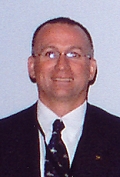FIG Commission 8

|
Work Plan 2003-2006
Title
Spatial Planning and Development
 This
work plan in .pdf-format as adopted by the General Assembly in Washington, DC in
2002.
This
work plan in .pdf-format as adopted by the General Assembly in Washington, DC in
2002.
 Ms.
Diane Dumashie,
Chairperson of Commission 8, 2004-2006. Ms.
Diane Dumashie,
Chairperson of Commission 8, 2004-2006.
Terms of reference
- Regional and local structure planning
- Urban and rural land use planning
- Planning policies and environmental improvement
- Urban development and implementation
- Public-private partnerships
- Informal settlements and urbanisation in developing countries
- Environmental impact assessment
Mission statement
The activities of Commission 8 in the years 2002-2006 will be focuses on
physical planning at all levels, undertake and learn from case studies and
enhance understanding and knowledge of planning systems. The importance of
sustainable development, environmental issues in planning and environmental
impact assessments (EIA) in spatial planning procedures will be key issues
throughout the plan period.
The commission will continue to co-operate with countries in social and
economic transition, in Eastern Europe and other parts of the world.
The commission will assist with the implementation of Agenda 21 (from the Rio
Earth Summit) and the Global Plan of Action (from the Habitat II Conference in
Istanbul) at the local and urban level. It will pay particular attention to
informal settlements and urbanisation problems in developing countries.
The commission will carry on looking for solutions for implementation
problems and will especially focus in that way on inner cities and declined
areas. It will focus on public/private partnership as a way to work on solutions
for those problems and other tools that promote planned and sustainable city,
town, land use and development.
General
Commission 8, Spatial Planning en Development, has been working since the
Brighton Congress according to the work plan. After the Washington Congress,
April 2002, this work plan will be continued by the work which is mentioned in
the work plan 2002-2006. Commission 8 tries to organise its work in three
different Working-Groups; each will focus on a particular part of the immense
broad working field of commission 8.
Council work plan
Commission 8 will strengthen itself to the implementation of the Council work
plan and commission 8 confirms herself to the general goals of the Federation
and in her work she will implement the specific goals of the Council:
- FIG best-practice
- Database
- Regional conferences
- Etc.
The world is changing rapidly; more and more people want to live in urban
areas and especially in cities. More cities will grow in the next 25 years to
large cities; large cities that, if we don't find soon enough adequate
solutions, will find themselves to un-solvable questions. One working-field of
commission 8, will focus on urban-regeneration. The aim of the working group is,
to find appropriate solutions to solve inner-city-problems or to find solutions
to avoid unacceptable use of inner-city-space and/or land in general.
By means of the work, commission 8 will stress that we, as surveyors, share
the responsibility for well-functioning cities. We should contribute to the
prevention of the arising of urban problem-areas. In fact, one of the goals of
commission 8 is to help to counter urban deterioration.
Policy Issues
The working group started its work after the Melbourne Congress in 1994. It
deals with inner-city problems and regeneration of established urban areas. The
aim of the group is to observe the different projects on a 12-years time to
examine the projects in such a way to determine whether the methods or
instruments used present are successful and applicable way for other projects in
other countries.
Chair
To be appointed.
Reports
The final report of the working-group will be presented at the FIG Congress
in Munich in 2006.
Beneficiaries
FIG-member associations, governments, international agencies, individual
surveyors and others involved in the problems of urbanisation.
Working Group 8.2 - PPP - Public Private Partnership
Policy Issues
In the last years PPP has become more and more important in the planning and
development of projects in city-areas and land-projects. The aim is to combine
the strength of the instruments of the public-part and the private part/money
that comes from the private partners.
Commission 8 has already paid a lot of attention to this topic in the last 4
years. Many papers were about this topic. Spoken is e.g. about PPP-project in
Germany and the Netherlands. Also has been spoken about instruments as the
Neighbourhood-Development-Corporation in Rotterdam and the NC-Enschede, as
instruments to help declined areas.
The commission will:
- collect ideas and build up a network for the exchange of ideas,
- work closely with other commissions on this topic,
- try to organise an workshop on this topic or will co-operate in workshops
held on this topic,
- form and agree a collaborative working group including professionals and
academics.
Chair
Prof. Kari I. Leväinen (Finland), e-mail: Kari.Levainen[at]hut.fi
Beneficiaries
FIG-member associations, governments, international agencies, individual
surveyors and others involved in the problems of urbanisation.
Working Group 8.3 - Global Urbanisation Process in Large Cities
Policy Issues
Identifying:
- Global urbanisation problems and processes
- Special problems of informal settlements in large cities
- Relationship between land allocation and development economics applied to
temporary housing settlements
- Coastal and environmental pressures and solutions.
Chair
Diane Dumashie (United Kingdom), e-mail: atfchair_p[at]ymail.com
Specific project(s)
- Collect ideas and build up a network for the exchange of experiences and
sustainable models, working closely with the other FIG-commissions, and
building upon the recommendations of the FIG Task force on sustainable
development and UN-HABITAT
- Gather and development case studies of sustainable urban development
planning and management with the emphases on two key forces:
- Land values tied in with the mechanisms for spatial planning
- Allocation of land use to determine the allocation of housing land
- Form a agree a collaborative working group including professionals and
academics to study both top down legislation as well as bottom up community
action focusing on urban land economic dimension of large cities
- Explore and develop the application of a new Information Management and
Decision Support System as an economic land regeneration tool in Coastal
Cities
Beneficiaries
FIG-member associations, governments, international agencies, individual
surveyors and others involved in the problems of urbanisation.
Working Group 8.4 - Disaster Management – Preventing
Environmental Catastrophes by Spatial Planning and Land Management
Under preparation - WG established in August 2003
Policy Issues
Chair
Univ.-Prof. Dr.-Ing. Theo Kötter (Germany), e-mail:
koetter[at]uni-bonn.de
Specific project(s)
Beneficiaries
Co-operation with Sister Associations
The work and interest of Commission 8 and the Intenational Federation of
Housing and Planning (IFHP) are very close; for that reason Commission 8 will
make different effords to co-operate with the IFHP and implement the Memorandum
of Understanding signed in Washington, DC in April 2002.
Co-operation with the United Nations Agencies
Commission 8 will strengthen to co-operation with the United Nations. If
possible, we will try to contribute as much in the upcoming UN-HABITAT and UNEP
activities.
Commission 8 will make links to the UNEP and work as the focal point in
implementing the MoU between FIG and UNEP. In the coming year it will report on
how the co-operation will be organised. Items can include e.g.:
- monitoring sea level rise
- coastal motion and hazard mitigation.
The link with commission 8 has to be on the topics of the commission
statement.
Other Activities
Activate more national active delegates to the work of Commission 8.
Commission 8 will maintain and develop the commission home page, linkages to
other relevant home pages and new pages or other networks for special projects,
to keep commission delegates, other FIG members, users of surveying services and
the public involved in and informed about the work of the commission.
The commission will publish the commission newsletter on a continuing basis,
including on the commission home page.
The commission chair and commission vice-chair will participate in several
conferences on the commission working-fields, although we must realise that
both, chair and vice-chair(s), are working as a private entrepreneurs and the
chancellance for the upcoming years is, how to increase the active participation
in commission 8 working-groups.
Co-operation with other commissions
Commission 8 intends to co-operate with other commissions to try to work
together in different fields of the commission, for instance: with Commissions 7
and 9. It will try to organise a symposium with commissions 7 and 9 on the
Public Private Partnership and the Informal Settlements in undeveloped countries
in 2004/2005.
Calendar of Events
Commission 8 will try to organise at least two working-weeks in the upcoming
4 years:
2003 United Kingdom (working week on global urbanisation in large cities).
2005 P.M.
Of course, Commission 8 will organise annual meeting during the upcoming
FIG-events in the upcoming years 2003-2006.
Just to activate more delegates in the commission 8 work, we will urge
delegates to write their papers for the upcoming years to the topics of the
working groups 8.1, 8.2 and 8.3.
Also commission 8 will do its utmost to reflect the topics of the working
groups in the technical excursions, which are organized by the hosting country.
Commission Officers
Commission Chair
 |
Commission Chair
Ms. Diane Dumashie
Dumashie Associates
Keta House
1 Worgret Hill
Wareham
Dorset BH20 6AD
UNITED KINGDOM
Tel. + 44 1929 555 392
Fax + 44 1929 555 392
E-mail: atfchair_p[at]ymail.com |
Commission Chair-Elect and Chair 2006-2010
 |
Simon Adcock
Office of the Valuer-General
Marland House
Level 15/570 Bourke Street
Melbourne
Victoria 3000
AUSTRALIA
Tel. + 61 3 8636 2558
Fax + 61 3 8636 2519
E-mail: simon.adcock[at]dse.vic.gov.au
|
Vice-Chair and Chair of Working Group 8.1 - Urban Regeneration
To be appointed.
Vice- Chair and Chair of Working Group 8.2 - PPP - Public Private
Partnership
Dr. Kari I. Leväinen, Professor of Real Estate and Facilities Management
Helsinki University of Technology
Department of Surveying, Institute of Real Estate Studies
P.O. Box 1200
02015 HUT
FINLAND
Tel. + 358 50 516 0047
Fax + 358 9 465 077
E-mail: Kari.Levainen[at]hut.fi
Vice-Chair and Chair of Working Group 8.3 - Global Urbanisation Process in
Large Cities
Ms. Diane Dumashie
Dumashie Associates
Keta House
1 Worgret Hill
Wareham
Dorset BH20 6AD
UNITED KINGDOM
Tel. + 44 1929 555 392
Fax + 44 1929 555 392
E-mail: atfchair_p[at]ymail.com
Vice Chair and Chair of Working Group 8.4 - Disaster Management – Preventing
Environmental Catastrophes by Spatial Planning and Land Management
Univ.-Prof. Dr.-Ing. Theo Kötter, Vice Chair and Chair of WG 8.4
Institut für Städtebau, Bodenordnung und Kulturtechnik, ISBK
Der Rheinischen Friedrich-Wilhelms-Universität Bonn
Nussallee 1
D-53115 Bonn
GERMANY
Tel. + 49 228 732 610 ext. 12
Fax + 49 228 733 708
E-mail: koetter[at]uni-bonn.de
22 September 2003 |
























 Ms.
Diane Dumashie,
Chairperson of Commission 8, 2004-2006.
Ms.
Diane Dumashie,
Chairperson of Commission 8, 2004-2006.